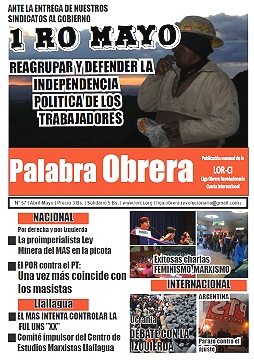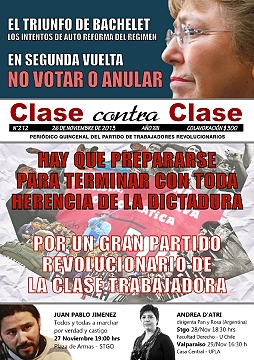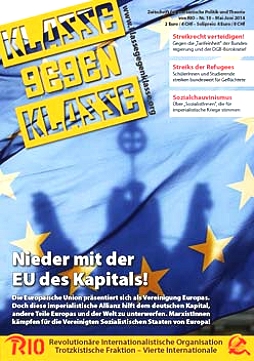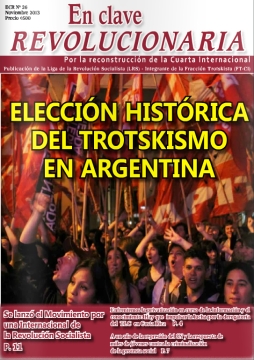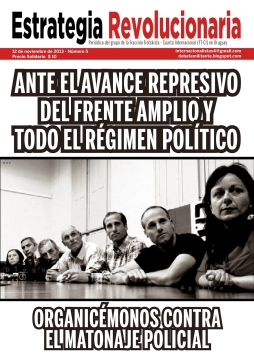Presidential Elections in Venezuela
Faced with the lack of an independent working-class candidate: Vote a blank ballot
01/12/2006 En Clave Obrera N° 8
In the current electoral process we call for a blank-ballot vote, in the
face of the lack of an independent working-class candidacy that
represents the workers of Venezuela. Clearly the candidacy of Manuel
Rosales [the candidate backed by the United States government]
represents nothing other than the naked interests of imperialism and of
the sectors of the national bourgeoisie closest to the Yankees; the same
ones who defeated the Caracazo [a popular uprising in Caracas in 1989]
with blood and fire, the same ones with their plans of servility to the
IMF and World Bank, the same coup-plotters of April [2002], the bosses’
lockout [of 2003] and the sabotage of the oil industry. The masses of
workers and poor people know this and it’s been a long time since they
gave their support to these traitorous, starvation-causing, and
repressive sectors! Therefore among the workers the discussion obviously
turns on the program and the figure of [Venezuelan President Hugo]
Chávez, who is said to lead a revolution and represent the interests of
the exploited and poor people.
In earlier issues [of En Clave Obrera, the journal of the Venezuelan
Trotskyists], we have explained in detail why, even when he confronts
puntofijismo [the corrupt power-sharing agreement between Venezuela’s
three old capitalist parties] at the national level, even when he has
driven the clique of Adecas [politicians from the traditional capitalist
Acción Democratica party] and Copeyanas [politicians from the
traditional capitalist Political Electoral Independent Organization -
Social Christian Party or COPEI] from power, even though he has been the
target of coup attempts from the bourgeoisie and the imperialists, which
he rebuffed with the massive and militant support of the people, Chávez
and his government, far from proposing a revolutionary, and thus
anti-imperialist and truly anti-capitalist, program, are heading a
program of reforms which do not stray outside the bounds of "national
development" in the midst of an alliance between the state and sectors
of the national bourgeoisie. It is a limited bourgeois-nationalist
program, which is not capable of completing the struggle for national
liberation, and even less so, the struggle against capitalist exploitation.
All the parties, groups, and activists that call themselves leftists in
this country back the call for Chávez’s reelection, including all the
so-called Trotskyist groups that exist in this country. On this
bandwagon we find everyone, from those who support Chávez
unconditionally, who are an integral part of Chávez’s party and its
leadership, such as the "parties of change", the Communist Party and the
UPV [Venezuelan Popular Union], to those who support Chávez
"critically," "tactically" in order to "defeat the right wing," or in
order to "accompany the masses," as is the case with most of the
so-called Trotskyist currents. So it would seem that, whether one is a
through and through Chavista, or claims to be an "independent"
revolutionary or "revolutionary Marxist," there’s nothing wrong with
electorally supporting Chávez.
The main problem is that in any presidential election, what we are
choosing are the political platforms for the nation of the various
political formations, which represent distinct classes or factions of
those classes. The vote for a particular presidential choice implies
backing his political program and the class interests which it
represents. With this perspective, even though it is not the program of
imperialism and the sectors of the national bourgeoisie most closely
allied to imperialism, Chávez’s program nevertheless does not represent
the interests of the workers and poor people, but a nationalist course.
According to Rosales and Co., Venezuela must open its doors for
imperialism to exploit our resources and workforce without interference,
including the oil, with the state acting only as a guardian of the
bourgeois legality and stability, and in this way to prepare the country
for every Yankee imperialist initiative. It is a plan for complete
surrender, without questioning the super-profits that the imperialists
take away from us, resigning itself to the crumbs left for the bosses
who are gears in the machine of transnational capital and for the state
bureaucrats who favor these businesses. It is the program of the years
of the decadence of puntofijismo.
As for Chávez, he proposes a central role for the state in the
management of the economy, keeping property and the control of the oil
profits in its hands, also negotiating with transnational corporations,
but placing these under state regulation; thus, the oil profits in the
hands of the state and the taxes levied on foreign capitalists are used
for "national" development and production, that is, production by
state-owned and private enterprises, as well as for social programs, and
the development of cooperatives and small businesses. It is a program
that lays claim for the "country" to the oilfields and to a portion of
the imperialists’ profits, with which it proposes to promote the growth
of the national bourgeoisie (its alliance with Fedeindustria [a bosses’
federation] and the ranchers’ association Confagan is no accident). Its
discourse on the level of international relations with Yankee
imperialism is one of greater independence, which does not align itself
with US politicians and seeks wider margins of action, along with
alliances with other international or regional power centers such as
China, Russia, and Iran, as well as reliance on the formation or
regional blocs to negotiate better deals with imperialism [1] such as
MERCOSUR, behind which stand the bourgeoisies of the other semi-colonial
countries and the transnational corporations that operate within them.
On the other hand Chávez is supported by a huge mass movement which
hopes for solutions to its demands. All this is what earns Chávez the
tenacious opposition of Yankee imperialism and the big national bourgeoisie.
But in Chávez’s program, and after eight years of his government we see:
no expulsion of the transnational corporations nd expropriation of the
imperialist capitalists which have robbed us for almost a century, no
expropriation of the parasitic bankers and socialization of their
riches, no expropriation of the exploitative national bourgeoisie and
management of the economy under the control of the workers and poor
people, neither any expropriation without compensation of the landlords
and giving of their lands over to the poor peasants. Under Chávez’s
program and his government the bosses and bankers (national and
international) have continued about their lucrative business, living off
the exploitation and the poverty of the working class. In the final
analysis this is a picture of the normal operation of any capitalist
economy. Certainly, the majority of the workers and poor people believe
in Chávez and trust that their problems will be solved by his hand. The
fact that no important sector of the workers upholds an independent
working class program is in large part the fault of the leadership of
the workers’ movement, particularly those who call themselves
revolutionary Marxists, since they have refused to clearly explain what
the real intentions of the government are, and to use the many struggles
that the workers have been waging to show them that the reason why their
major demands have not been met is the fault of the government. In this
sense, it is the responsibility of the majority of the leadership of the
PRS [Party of Revolution and Socialism, a new party based in the
Venezuelan UNT union federation] which has not run a candidate of the
workers themselves, of their own struggle against capitalism, when real
possibilities existed to organize such a campaign. It is against this
lack of a working class candidate that we call for voters to cast a
blank ballot.
1. Bush and the Republicans’ recent electoral defeat increases the
possibilities for this type of international politics.








